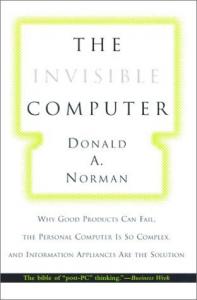 The Invisible Computer: Why Good Products Can Fail, the Personal Computer Is So Complex, and Information Appliances Are the Solution
The Invisible Computer: Why Good Products Can Fail, the Personal Computer Is So Complex, and Information Appliances Are the Solution
The MIT Press, 1998
Agent: Sandra Dijkstra
Technologies have a life cycle, says Donald Norman, and companies and their products must change as they pass from youth to maturity. Alas, the computer industry thinks it is still in its rebellious teenage years, exulting in technical complexity. Customers want change. They are ready for products that offer convenience, ease of use, and pleasure. The technology should be invisible, hidden from sight.
In this book, Norman shows why the computer is so difficult to use and why this complexity is fundamental to its nature. The only answer, says Norman, is to start over again, to develop information appliances that fit people's needs and lives. To do this companies must change the way they develop products. They need to start with an understanding of people: user needs first, technology last -- the opposite of how things are done now.
Reviews:
“Norman offers an enlightening and pragmatic account of the interrelated currents and riptides affecting product development in the computer/information industry. Readers who digest this analysis will be well rewarded.”
—Publisher’s Weekly
“The more things that computers do, the more complicated they invariably become to use. Norman contends that the personal computer is nearing the end of its life cycle, to be replaced by intuitive, task-focused ‘information appliances.’”
—Library Journal
“Norman's thesis is that a number of modern products, most notably personal computers, come with a technological overload that makes them hard to use. He pictures a ‘vast chasm’ that separates the early users of a device, who will put up with complex technology in order to reap the benefits offered, from later users, who want reliability and simplicity."
—Scientific American
"Don Norman's dramatic transformation from design critic to digital designer has made his observations in The Invisible Computer even more insightful and insightful."
—Michael Schrage, Research Associate, MIT Media Lab, and authorof Getting Real
"Don Norman has established himself as high technology's leading thinker on user interfaces and on why PCs are too complex."
—Wall Street Journal
"...the bible of 'post-PC' thinking."
—Business Week